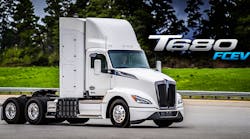Loblaw to add FCEVs to zero-emission fleet
Loblaw Companies is expanding its zero-emission fleet.
After adding two battery-electric vehicles earlier this year, the Canadian grocery retailer plans to purchase five Kenworth T680 hydrogen fuel cell electric vehicles (FCEVs) with an expected range of more than 700 kilometers (435 miles), hoping the trucks will provide greater flexibility to complete long-haul, zero-emission deliveries.
Loblaw’s first two electric Class 8 daycabs now are making short-haul deliveries from the company’s Boucherville, Quebec distribution center to stores within the Greater Montreal Area. In addition to the five hydrogen FCEVs from Kenworth, the company has approximately 35 battery-electric vehicles on order from various manufacturers, with many expected to be on the road by the end of 2024, Loblaw reported.
“We’re a large company, operating an extensive supply chain network to stock stores in thousands of Canadian communities. That means our trucks are on the road in every province and territory, which creates a large footprint,” Rob Wiebe, chief administrative officer for Loblaw, said in a news release. “We see the opportunity to fight climate change and know we have a responsibility to find new ways to cut our carbon emissions.
“As technologies advance, we will advance, too.”
See also: Loblaw rolls out first battery-electric truck
This FCEV purchase is meaningful because it begins to solve the zero-emission long-haul challenge, delivering a “viable decarbonized solution” for regional trips, Loblaw said. Today, battery-electric trucks cannot haul great distances without frequent charges, but hydrogen can more reliably extend driving distances.
Loblaw was the first Canadian organization to sign a letter of intent to purchase FCEVs as part of its plan to adopt new technology to help meet environmental goals. The company’s efforts to pursue a zero-emissions long-haul fleet builds on a commitment to electrify its fleet of short-haul daycab trucks by 2030. This is part of Loblaw’s overarching commitment to achieving net-zero carbon emissions enterprise-wide by 2040.
From 2020 to 2022, Loblaw cut its greenhouse-gas emissions by 8%.
Kenworth’s T680 FCEV is powered by Toyota fuel cell technology and equipped with Toyota’s 310kW dual motor assembly capable of providing 415 horsepower continuously at a maximum payload of 82,000 lbs., and the Toyota Gen 2 dual fuel cell module.



